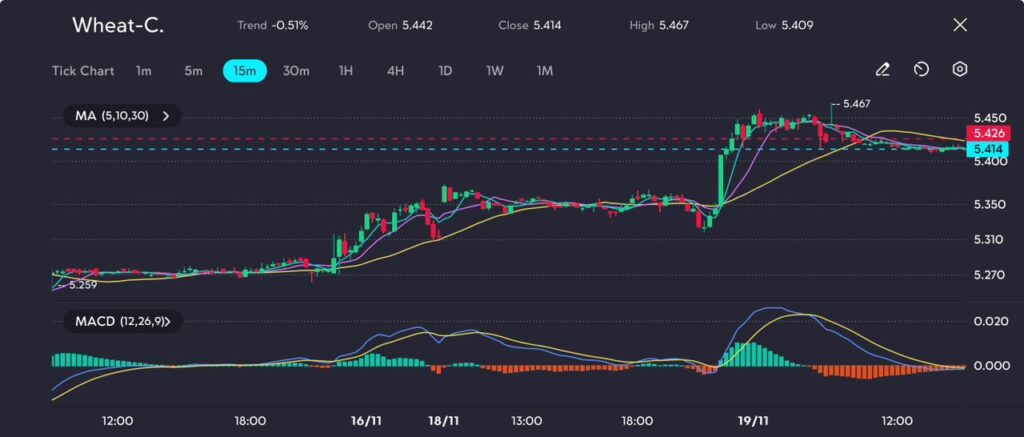Key Points:
- Wheat futures closed at $5.414, down 0.51%, after briefly reaching $5.467 during intraday trading.
- Easing Black Sea tensions and improved U.S. crop conditions kept prices under pressure.
Chicago wheat futures stabilised on Tuesday, closing at $5.414 per bushel after touching an intraday high of $5.467.
The market pulled back 0.51% during the session, as concerns over escalating Black Sea tensions faded, and improved U.S. crop conditions capped gains.

Picture: Wheat prices hold steady near $5.42 after recent gains, with momentum slowing at resistance levels, as seen on the VT Markets app.
The decline reflects easing concerns following the White House’s move to lift restrictions on Ukraine using U.S.-supplied missiles for strikes on Russian territory.
Wheat Market Balances Risk and Supply Factors
While the growing conflict in the Black Sea initially supported wheat prices, the gains faded as the market digested news of Ukraine’s plans for long-range missile strikes in the coming days.
Analysts at Bergman Grains Research cautioned against bearish sentiment in wheat, citing tight global supplies projected near multi-year lows.
Improved U.S. winter wheat crop conditions added to bearish sentiment. The USDA’s weekly crop condition report revealed better-than-expected improvements following much-needed rainfall in the Plains, alleviating some concerns about domestic supply.
See also: Dollar Index Holds Despite Market Caution
Meanwhile, Russian wheat export prices have declined, reflecting global trends, as strong exports continue ahead of a planned export quota later this season.
Global Trade Agreements
The market remains alert to potential escalations in the Black Sea conflict, which could disrupt grain exports and increase volatility in wheat prices.
Additionally, Brazil’s impending trade agreements with China, expected to cover key agricultural commodities such as fruit, beef, and pork, could shift global trade dynamics, particularly for soybeans and related products.
Cautious Market Outlook
Wheat prices may remain range-bound in the near term as traders monitor developments in the Black Sea region and domestic crop conditions.
Traders should stay alert to geopolitical updates and agricultural trade agreements, particularly Brazil’s announcements with China, as these factors could influence short-term price movements across the grain and oilseed complex.









